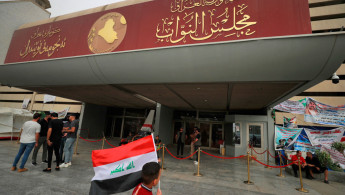Iraq's former parliament speaker Mahmoud Al-Mashhadani says he has majority support for contested role
After more than nine months of a vacant parliamentary speaker position, Iraqi Sunni lawmaker Mahmoud Al-Mashhadani announced that he has secured a majority of support from parliament members to run again for the role.
The position has remained unfilled since the removal of former Speaker Mohammad Al-Halbousi last November, with intense political disagreements stalling the selection of a successor.
Al-Mashhadani, a former Speaker of the Iraqi Parliament, shared the news on the social media platform X on Sunday evening.
"I am honoured and pleased with the approval of the majority of the national spectrum of parliament members for my candidacy for the Speaker position," he said, adding that "the dispute over this issue has been resolved."
He also pledged to uphold this trust, stating, "I will be with them and for them all, by the public interest, as indicated by the internal regulations of the council, while adhering to the legal and constitutional framework in managing the council." He did not provide further details.
Al-Mashhadani, backed by the Coordination Framework—an alliance of Iran-backed Shia blocs with a parliamentary majority—had previously attempted to secure the speaker position in earlier sessions but failed to obtain the necessary votes, which require an absolute majority of the 329 members.
Recently, the Azm and Sovereignty Alliances officially endorsed him, marking a concerted effort to resolve the prolonged political deadlock that has left the position vacant.
Complications and Factionalism
The situation has been further complicated by reports from sources within the Coordination Framework that former Speaker Mohammad Al-Halbousi had formally proposed Ziad al-Janabi, leader of the Initiative Bloc, as a candidate for the position. This proposal reportedly garnered support from over 50 Sunni lawmakers, highlighting ongoing factionalism within the Sunni political landscape.
Despite this, the Coordination Framework stated it will not amend the House's by-laws and will adhere strictly to the Federal Court's decision to elect a speaker during the first parliamentary session, without reopening nominations for new candidates.
The deadlock over the speaker's position led to multiple delays in parliamentary sessions. The most recent vote, held on 19 May 2024, failed to elect a new speaker, with Al-Mashhadani receiving 137 votes and his rival, Salem al-Issawi, securing 158 votes—neither reaching the required majority of 165 votes.
The session was marked by significant tensions and deep political divisions, reflecting the broader challenges facing Iraq's political system. Mr Al-Issawi has not officially withdrawn his nomination for the speakership, even after Mr Al-Halbousi backed Al-Janabi for the post, adding further uncertainty to the process.
This political stalemate has led to legislative paralysis, stalling key decisions and exacerbating Iraq's political challenges.
Earlier this month, Nouri Al-Maliki, leader of the State of Law coalition, reiterated the Coordination Framework's commitment to completing the political process and ending the speaker's position crisis, denying any intention by the ruling coalition to take control of the position.
The speaker's position has been vacant since November 2023, following the removal of Mohammad Al-Halbousi by Iraq's Federal Supreme Court amid allegations and a legal challenge questioning his legitimacy. Since then, Iraq's parliament has struggled to elect a new speaker, with various factions unable to reach a consensus on a suitable candidate.
The support from the Azm Alliance, led by Muthanna al-Samarrai, and the Sovereignty Alliance, headed by Khamis Al-Khanjar, is seen as a coordinated effort to break the deadlock.
Al-Mashhadani, who served in the role from 2006 to 2009, is recognised for his experience and balanced approach, qualities his supporters believe are essential for navigating Iraq's current political complexities.
Iraq, a mosaic of different ethnic and religious groups, operates under complex power-sharing arrangements: the largely ceremonial role of president traditionally goes to a Kurd, the prime minister to a Shia, while the speaker of parliament is usually Sunni.
However, parliament is dominated by a coalition of pro-Iran Shia parties, reflecting the country's largest religious group.
The new speaker's term will be relatively short, with a general election scheduled for 2025.




 Follow the Middle East's top stories in English at The New Arab on Google News
Follow the Middle East's top stories in English at The New Arab on Google News

![A group of Palestinians, foreign and Israeli activists gather to participated in an olive picking event on the land in the town of Battir, which is under threat of confiscation by Israel in Bethlehem, occupied West Bank on 8 November 2024. [Getty]](/sites/default/files/styles/image_330x185/public/2182930803.jpeg?h=199d8c1f&itok=__0LgGsa)
